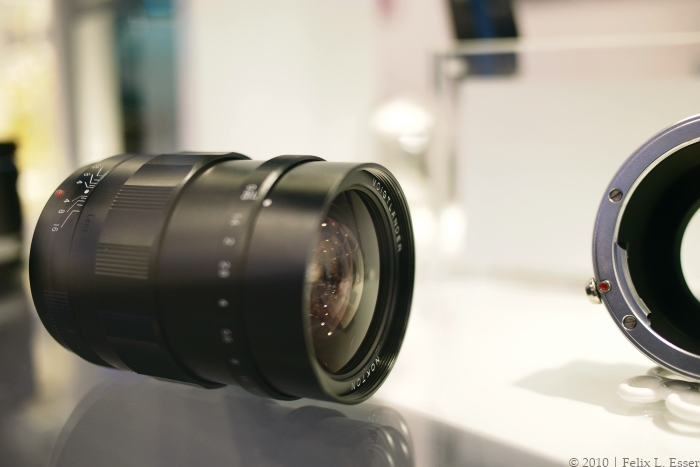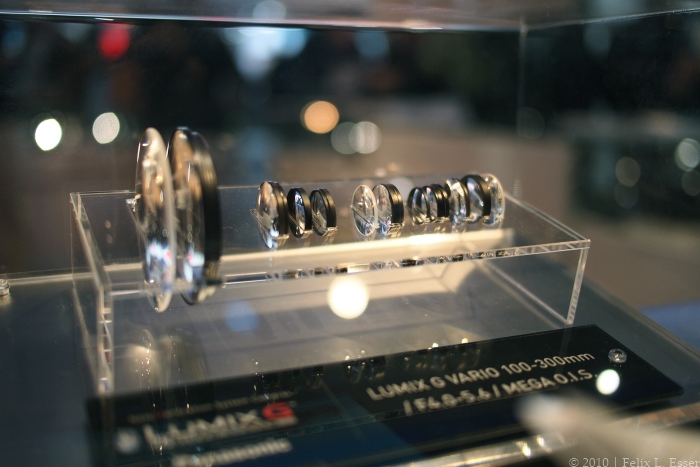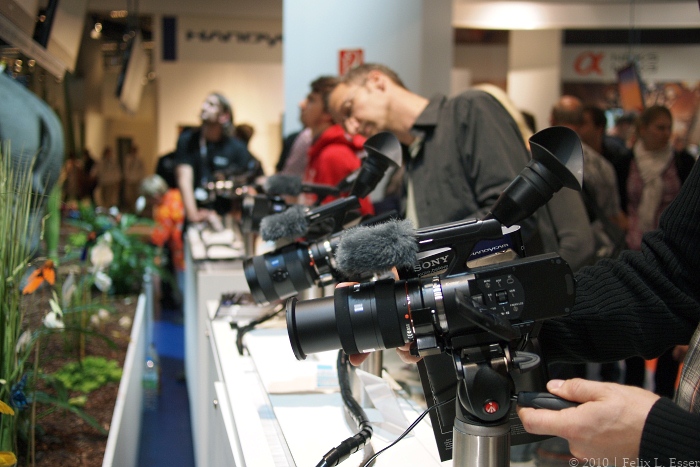As I previously announced, yesterday I spent the day visiting photokina 2010 in Cologne, and I brought back with me a huge load of impressions, pictures of latest models, of prototypes, and other stuff. So without much ado, here’s my report on the fair — by manufacturer, in alphabetic order.

Photokina 2010 south entrance
General impressions from the fair will be posted in a seperate gallery soon.
CAUTION! Massive amount of pictures ahead! Make sure your connection is fast enough, and that you have enough time! 
Canon
The biggest players — Canon, Nikon, Olympus, Panasonic, Samsung and Sony — also had the biggest stands, obviously. Canon made no exception. Much was to see, but not much that would have been of interest to me, personally, as I am — you might be aware of that — not a great fan of SLRs, and not really interested in compacts. The S95 has already been reported on, and I found nothing new or special at Canon’s stand. (No mirrorless camera so far!)
Fujifilm
The greatest announcement at Photokina this year was surely the Fujifilm X100 — a rangefinder-like hybrid camera, featuring a fast f/2 35mm-equivalent lens, all manual controls, a metal body and an optical viewfinder into which information from a semi-translucent, high-resolving LCD can be projected.

The stunning, beautiful, fantasic, revolutionary, loved-by-all, photokina highlight Fujifilm X100 prototype.
Look: it’s even got the “photokina STAR” award! I honestly believe this was one of the biggest announcements, stirring up the whole photographic community. And isn’t it looking just great! The lever top-left of the lens is not for the self-timer, but to switch between optical viewfinder with projected info and electronic-only image, for which the OVF is darkened. The lens has a dedicated aperture ring with an additional ‘A’ position for shutter-priority and automatic modes.

The backside of the X100.
Top-left: The large and bright viewfinder, with a diopter adjustment wheel to the left and a sensor detecting your approach to the right. Top-right, from left to right: adjustment wheel for shutter speed, also with an ‘A’ position, traditional shutter button and adjustment wheel for exposure correction.
Not much was working yet, as the prototype didn’t have a sensor installed. But you could have a look through the viewfinder, which was alrady fully working:

A look through the X100's viewfinder in optical mode with projected information.
The X100’s viewfinder is really large, bright and clear, and the semi-transparent LCD used for projection information into the OVF is fabulous! Can’t wait for this camera to be available! (The X100’s sensor is already fully developed, as the Fujifilm representative at the X100 stand explained, but had not been installed in the prototype model yet.)
Fujifilm also had a disected W3 on display:

A disected Fujifilm W3 3D camera. You can see the two lens+sensor modules in the middle of the front row.
Kenko
The chinese manufacturer best known for their camera accessories and Tokina branded lenses had a prototype of their upcoming C-mount ILC on display (so it did not get lost, in fact). As reported earlier, it’s going to feature a 1/2.33″, 14 megapixel sensor, and will come with a 6mm f/1.4 lens in February 2011. I think I’ll get one if funds allow so.

The upcoming C-mount ILC from Kenko.
Leica
There we are, Leica. As you know, I’m a big fan of anything featuring the famous red dot, so I was of course excited to visit the Leica stand. I knew there wasn’t much to be expected, as the M9 Ti, the black X1 and the new re-badged Panasonic compacts had already been anounced last monday. But nonetheless, I did of course have a look at everything!

The Leica M9 Titanium. I could continue raving about it, but that would be highly redundant, wouldn't it ... ;-)

The M9 Ti in its cosy box, together with the special titanium 35/1.4 Summilux and other accessories.
This gentleman was so nice as to let me try the 50/0.95 Noctilux-M on my M8, and to my surprise focusing was spot on!

Trying the Noctilux-M 50mm f/0.95 on my M8 - forgot to turn lens detection on, though.
What a beast of a lens! While I’ve seen many stunning pictures taken with it, I wouldn’t want to lug one around with me. It is truly massive! And I’d reckon the huge front element would be a real pain in the ass to keep clean …
I could also put my hands on an M9, and boy, what a joy! So much nicer than the M8. Looks more solid, feels more solid. The framelines look right. The shutter is much quieter. I can really understand the fuss about it now.

The new black Leica X1 with the nice, grippy vulcanite covering. Oh, look, that's me in the viewfinder! :-)
The X1’s focusing is still as sluggish. Terrible! But the gentleman at the X1 showcase told me that Leica were currently working on a new firmware which could possibly contain routines for faster AF. But as we know from Olympus, in the end it’s the AF mechanism in the lens that is the ultimate bottleneck … (And judging by the noise the X1’s lens makes during focusing, I guess this is in fact the bottleneck.) Also no word on a possible X2.

The new D-Lux 5 (essentially a Panasonic LX5 with Leica design and firmware), fitted with the viewfinder known from the GF1.

An M9 sensor unit. Needs to be cleaned ...

The Leica S system showcase.
Nikon
Copy the text from Canon above, exchange ‘Canon’ with ‘Nikon’, and you’ll get an accurate description.
Olympus
Not much to report about, really, as there were no exciting new announcements. The whole PEN lineup was being exhibited, and I had the opportunity to try out the VF-2 (which is a blast), as well as the new 14-150mm and the 9-18mm. The 14-150 is really a nice superzoom, small and light and with decent IQ. The same holds true for the 9-18, with which I took this quick test shot:

The new M.Zuiko 9-18/4-5.6 on the Olympus E-P1.
Now that’s perspective! I’m contemplating adding this lens to my setup.
They also had some fancy pimped-up PENs in their showcases:

An E-P1 in zebra camouflage. Really not my taste ...

Dark red crocodile leather. Well, not real crocodile of course.

The white E-PL1 wearing light brown snake skin. Doesn't it look just fabulous!?

And the E-P1 in dark red snake skin. What a beauty!
Also, they had this in one of their showcases (which I also was able to try out later at the stand of its respective manufacturer):

The Voigtländer Nokton 25/0.95 for Micro Four Thirds!!!
The new 40-150 tele zoom, by the way, is exactly the size and shape of the 14-150 superzoom!
Panasonic
At the Panasonic stand, the latest addition to their G system lineup were presented, as well as the latest compacts, such as the LX5 and the FZ100. They also had the new 14/2.5 pancake and the 100-300mm super tele zoom. Another huge feature were their latest 3D products, in TVs as well as in camcorders and digital cameras – yes, they had the new 3D lens, and you could even try it out on a GH2! But let’s have a look at their stand one item at a time.

The new 14mm f/2.5 pancake (right), next to the 20mm f/1.7 pancake. It really is tiny!

A quick snap with the new 14/2.5. Not my focal lenght, but a nice little lens with much quicker focus than its bigger sibling.

The 14/2.5's optical architecture. Much more condensed in reality, of course.

For comparison: the optical architecture of the 100-300mm super tele zoom. One word: massive!

The new 12.5mm f/12 3D lens for Micro Four Thirds on the equally new GH2. There was no way to see the 3D effect, though.
A Panasonic spokesman told me that for the 3D lens to be used on your MFT camera, you will need a firmware update to support it (except for the GH2, which already has the new firmware). For the GF1, though, there probably will be no such firmware, as it has a slower processor than the other G models. On my inquiry if a possible solution to this problem would be a GF1 successor, his answer was “probably” …

A disected GH2.

The GH2's new 18 mp sensor. As you can see, it's in 3:2 format to accomodate for the multi-aspect-ratio feature of the GH series.

A disected FZ100 superzoom bridge camera.

And another disected camera. This time, it's the new LX5.

The new Panasonic LX5 + viewfinder. Compare this to the picture of the Leica D-Lux 5 above.

A current Panasonic camcorder model with 3D lens.

Panasonic's latest 3D televisions, ready with 3D goggles to try out the effect.

Playing it big: the world's largest (152") 3D capable plasma TV.
To be honest, I found the fuss Panasonic made about their 3D products to be highly over the top. Personally, I wasn’t convinced by the 3D effect even on that huge 152″ screen. But maybe it’s just not my thing.
Rollei
Did you know these 6×6 TLR’s were actually still made? I didn’t! And there are actually three models: a 50mm f/4 wide-angle, an 80mm f/2.8 normal and a 135mm f/4 tele. Nice!

Rollei's three TLR models, with customized body coverings.
They run on 120 medium-format film, btw.
Samsung
Samsung’s highlight at the Photokina was of course the NX series, and chief among it the NX100. All has been announced already, so not much to report on.

Samsung's complete NX lineup, including cameras, lenses and accessories.

The new NX100, together with the two new NX lenses, the 20-50mm collapsible "i-Function" zoom, and the 20mm f/2.8 "i-Function" pancake.

And another disected camera! Guess which one it is this time ...
Sigma
The biggest announcement from Sigma was probably the SD1, their new flagship DSLR, featuring a completely new, high-resolving, APS-C sized Foveon sensor.

The new SD1 APS-C Foveon DSLR at the Sigma stand.
Sony
Sony, now also a big player in the DSLR segment, naturally had their focus there, showcasing each and every SLR model and lens they currently have in their lineup. I didn’t find my way to any of the new pellicle mirror SLTs (the a33 and a55), sadly, as I would’ve loved to try one out. But I found this:

Pimped-up NEX cameras. Left: featuring a Leica 90/4 Elmar-C. Right: featuring a 90/2.8 Elmarit-M.
They had even more pimped-up NEXs in that showcase, including one with an Olympus OM lens attached!
And here’s what’s to be expected lens-wise for the NEX system:

Upcoming Sony E-mount lenses, part 1.

Upcoming Sony E-mount lenses, part 2.
The “Wide-Angle, Fixed Focal Length and “High Performance Standard Zoom” sound especially interesting!
Sony also had a bunch of camcorders on display, both with A- and E-mount:

Sony A- and E-mount camcorders on display.
Voigtländer
Voigtländer’s was the other stand I couldn’t wait to visit, as I was keen on trying out both the new 25/0.95 MFT lens, as well as the new 75/2.8 Heliar Classic for M-mount. Apart from those two highlights, the complete Bessa camera and lens lineup was showcased.

The new Voigtländer 25/0.95 on my E-P1.

This friendly Voigtländer representative let me try the new 25/0.95. Oh boy ...
… what a piece of glass! When I took it off my camera, I told her I’d rather not give it back again. She replied: “Many said that already.”  And you know what the freakiest thing about this lens is? You can focus it far beyond the .2 meter distance marking on the barrel, making it virtually a macro lens! Of course @ f/0.95 and closest focusing distance, depth-of-field is virtually nonexistent …
And you know what the freakiest thing about this lens is? You can focus it far beyond the .2 meter distance marking on the barrel, making it virtually a macro lens! Of course @ f/0.95 and closest focusing distance, depth-of-field is virtually nonexistent …

Close-focusing the Voigtländer 25/0.95 @ f/0.95.

Bokeh test with the new Voigtländer 25/0.95 for Micro Four Thirds. Nice!
I now sooo want this lens …!
I also put my hands on the new 75mm f/1.8 Heliar Classic, Cosina’s new Voigtländer branded portrait lens for M-mount. Its body design is very similar to that of the 25/0.95 shown above, and the lady at the stand told me this design was also to be expected for future Voigtländer lenses.

The new Voigtländer Heliar Classic 75/1.8, tested on the Leica M8.
The picture isn’t tack-sharp, but focus was spot on, and I think you can already see it’s got a nice rendering and is a viable alternative to Leica’s 75mm lenses.
On my inquiry if the 50/1.5 Nokton was eventually going to be reintroduced in M-mount, the lady at the Voigtländer stand replied that this was not currently planned.
Zeiss
Not much to see here, as Zeiss didn’t announce anything new for Leica. But of course their complete Ikon camera and lens lineup was showcased, as well as their DSLR and cinema lenses.

Zeiss' complete M-mount lens lineup, from the 15mm f/4 to the 85mm f/2.

The Zeiss CP.2 cinema lenses in size-comparison with a Canon EOS 550D DSLR.
‘Compact Primes’? Really only in comparison with even larger cinema lenses … I’d love to see one in Micro Four Thirds mount on a GH1/2 
I could also try out a Zeiss Ikon rangefinder camera, and I have to say those are really nice! The viewfinder is much larger as Leica’s, so you can actually use a 28mm lens on the Ikon without compromise. My impression was, though, that Leica’s framelines are brighter and easier to see.
This concludes my brand-specific report on this year’s Photokina in Cologne, Germany. There was of course much much more to see, but I only had one day, and to see the whole fair you need at least two days — and that’s only visiting each stand for a few minutes! To have a closer look at everything, you would’ve needed the whole week, probably. It was that huge. And it set a new record: more than 180,000 visitors! It was an exciting experience, and I hope to be able to visit it again next time.



Thanks for the report. I am wondering about buying Voigtländer 25/0.95 for Micro Four Thirds and I have two questions, if you don’t mind answering:
1. Is the aperture ring step-less(continues) or is it step by step? I have Canon FD 50mm 1.4 and aperture is step by step and every time I change it, my camera shakes. Really annoying when filming a video.
2. Is the Manual focus assist(Panasonic GH1) automatically triggered when focus is used?
Futurity,
1. If I remember correctly (I only had the lens for a few minutes), the aperture ring has half-stop clicks, as with most Voigtländer lenses. If you’re looking for a lens with stepless aperture ring, you might want to look into C-mount lenses (although these won’t cover the whole sensor area of your GH1).
2. I’m using an Olympus E-P1, so I cannot speak for the Panasonic models. On my E-P1, I had to dial in focus magnification by hand. I believe it would be the same as with your GH1 + Canon 50/1.4 lens, as the Voigtländer 25/0.95 doesn’t feature any electronic contacts – it’s a completely mechanical lens.
I hope this helps you, and thanks for reading my blog!